Friday Reading Notes
As I have quite a few books on the go at the moment (and usually do), I thought it might be interesting to take a look at what I’m reading at the end of each week. It’ll be a while before these are reviewed, so I’ve decided that a few passing comments as I go along wouldn’t go amiss.
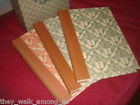 The Man of Property by John Galsworthy - This is the first volume in the Forsyte Saga and the third book from my Classics Club list. I’ve not got very far in it yet, because it’s far too big and its corners are far too sharp to read on the tube without damaging either myself or another commuter, so it has had to shift to being my bedtime book. I like what I’ve read so far though: I’ve been plunged into the middle of a Forsyte family gathering and it’s exactly like being thrust into a real party of strangers. It’s all a glittering whirl of social activity, polite conversation and hidden meanings and I’m watching from the sidelines feeling part bemused, part intimidated, but wholly fascinated by the characters in front of me. I can’t wait to continue.
The Man of Property by John Galsworthy - This is the first volume in the Forsyte Saga and the third book from my Classics Club list. I’ve not got very far in it yet, because it’s far too big and its corners are far too sharp to read on the tube without damaging either myself or another commuter, so it has had to shift to being my bedtime book. I like what I’ve read so far though: I’ve been plunged into the middle of a Forsyte family gathering and it’s exactly like being thrust into a real party of strangers. It’s all a glittering whirl of social activity, polite conversation and hidden meanings and I’m watching from the sidelines feeling part bemused, part intimidated, but wholly fascinated by the characters in front of me. I can’t wait to continue.
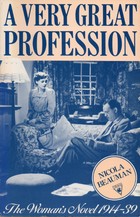 A Very Great Profession: The Woman’s Novel, 1913-1949 by Nicola Beauman – It’s been a while since I read any non-fiction, so it seemed serendipitous that I had this in my bag when I made my discovery that The Man of Property was too big to read on the train. Nicola Beauman is well known as the founder of Persephone Books, several of which I have read and enjoyed, and this book seems to be a sort of survey of that forgotten women’s literature that Persephone are republishing. The chapters are arranged thematically rather than by date or author, and so far I’ve only read the introduction and the chapter on war, but already the inside front cover of my copy is covered in the hastily pencilled details of titles I want to try. This is the sort of book that is bound to increase my reading list exponentially, as it is not only introducing me to loads of authors I’ve never even heard of, it is also making it very clear from the fascinating background material provided exactly why I should want to read each title and why they are important. It’s both an invaluable resource as well as interesting reading in its own right. I’ve really enjoyed finding out about women in wartime, how women’s war narratives differed from those of their male counterparts, and how both of these changed over time with the clarity of hindsight. A dangerous book for me and my book habit, but a fascinating one nonetheless.
A Very Great Profession: The Woman’s Novel, 1913-1949 by Nicola Beauman – It’s been a while since I read any non-fiction, so it seemed serendipitous that I had this in my bag when I made my discovery that The Man of Property was too big to read on the train. Nicola Beauman is well known as the founder of Persephone Books, several of which I have read and enjoyed, and this book seems to be a sort of survey of that forgotten women’s literature that Persephone are republishing. The chapters are arranged thematically rather than by date or author, and so far I’ve only read the introduction and the chapter on war, but already the inside front cover of my copy is covered in the hastily pencilled details of titles I want to try. This is the sort of book that is bound to increase my reading list exponentially, as it is not only introducing me to loads of authors I’ve never even heard of, it is also making it very clear from the fascinating background material provided exactly why I should want to read each title and why they are important. It’s both an invaluable resource as well as interesting reading in its own right. I’ve really enjoyed finding out about women in wartime, how women’s war narratives differed from those of their male counterparts, and how both of these changed over time with the clarity of hindsight. A dangerous book for me and my book habit, but a fascinating one nonetheless.
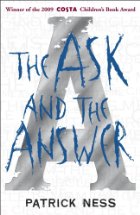 The Ask and the Answer by Patrick Ness – This one is the second book in Ness’ Chaos Walking trilogy. It was picked up this morning as my new train book (I tend to fall asleep on trains, which confuses me if I’m reading non-fiction), and it says a lot about it that I’m already nearly a quarter of the way through despite a light snooze. One of the things I’m enjoying about the young adult books I’ve been reading is how plot driven they are, and although I don’t think this one is shaping up to be quite as good as The Knife of Never Letting Go, it’s still fast paced and gripping. The first book was all presented from Todd’s perspective, but this one alternates his narration with Viola’s which I don’t find quite so interesting. The plot is still good and I have no idea where it’s going (always a good sign at this stage in a book) but the writing doesn’t feel quite as innovative the second time around.
The Ask and the Answer by Patrick Ness – This one is the second book in Ness’ Chaos Walking trilogy. It was picked up this morning as my new train book (I tend to fall asleep on trains, which confuses me if I’m reading non-fiction), and it says a lot about it that I’m already nearly a quarter of the way through despite a light snooze. One of the things I’m enjoying about the young adult books I’ve been reading is how plot driven they are, and although I don’t think this one is shaping up to be quite as good as The Knife of Never Letting Go, it’s still fast paced and gripping. The first book was all presented from Todd’s perspective, but this one alternates his narration with Viola’s which I don’t find quite so interesting. The plot is still good and I have no idea where it’s going (always a good sign at this stage in a book) but the writing doesn’t feel quite as innovative the second time around.
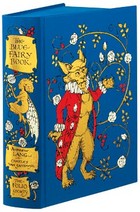 The Blue Fairy Book by Andrew Lang – I’ve had this lovely collection of tales on the go since sometime in December, but I’m in no hurry to rush reading such a beautiful volume. This was one of the books that persuaded me that I needed to join the Folio Society in order to make them mine, and reading through this one makes me so glad I gave in. It’s illustrated by Charles van Sandwyck with glorious watercolours and little pen and ink drawings so I seem to spend as much time gazing at the pictures as I do actually reading the text. The stories are a mixture of familiar fairy tales and ones I haven’t heard before, which always makes for interesting reading. Sometimes I only manage a story or two a week, but I’m quite happy savouring them.
The Blue Fairy Book by Andrew Lang – I’ve had this lovely collection of tales on the go since sometime in December, but I’m in no hurry to rush reading such a beautiful volume. This was one of the books that persuaded me that I needed to join the Folio Society in order to make them mine, and reading through this one makes me so glad I gave in. It’s illustrated by Charles van Sandwyck with glorious watercolours and little pen and ink drawings so I seem to spend as much time gazing at the pictures as I do actually reading the text. The stories are a mixture of familiar fairy tales and ones I haven’t heard before, which always makes for interesting reading. Sometimes I only manage a story or two a week, but I’m quite happy savouring them.
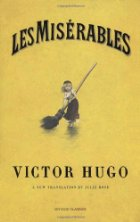 Les Miserables by Victor Hugo – Les Mis has been sadly languishing of late and through no fault of its own. I started this book and loved it almost immediately, but it’s big and heavy and (like Galsworthy) not a train book. It also was shunted aside for the less enjoyable more more easily accomplished task of reading Moby Dick. Now that that burden has been lifted, I’m looking forward to getting back to Les Miserables. I know I have a particularly good translation (thank you, Julie Rose) and the author’s voice shines through. Given his subject matters and reputation, I had expected Hugo to be a bit, well, miserable if I’m honest, but it turns out he has a wicked sense of humour and a great wit. I’d happily read him describing the exact layouts of houses for much longer than he does, which is saying something.
Les Miserables by Victor Hugo – Les Mis has been sadly languishing of late and through no fault of its own. I started this book and loved it almost immediately, but it’s big and heavy and (like Galsworthy) not a train book. It also was shunted aside for the less enjoyable more more easily accomplished task of reading Moby Dick. Now that that burden has been lifted, I’m looking forward to getting back to Les Miserables. I know I have a particularly good translation (thank you, Julie Rose) and the author’s voice shines through. Given his subject matters and reputation, I had expected Hugo to be a bit, well, miserable if I’m honest, but it turns out he has a wicked sense of humour and a great wit. I’d happily read him describing the exact layouts of houses for much longer than he does, which is saying something.
Has anyone read any (or all; these aren’t exactly new titles) of these? What did you make of them?